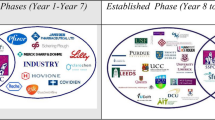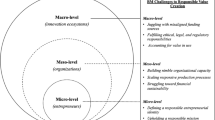Abstract
No one company has everything it takes to run a business successfully. It is always beneficial for companies to have effective partnerships and collaborations with multinational companies, if only to bring together the multiple skills and resources required to improve their business outcomes. Partnerships are important and, accordingly, Sohar University (SU) has realized that working in alliance, or in partnership, is the only way to build stronger and more equitable communities working for a common purpose. This was reflected in the SU Strategic Plan 2018/2023, as it includes a standalone strategic goal entitled “Connect and Collaborate”. This is designed to build strategic alliances with national, regional, and international communities to support innovation in educational, social, cultural, and economic development. However, there is no doubt that the COVID-19 pandemic has considerably disturbed or, at the very least, slowed down most economic activities all over the world and that it has impacted every aspect of everyday life. It has also affected partnerships activities that higher education institutions are usually engaged in. A study conducted by the National Centre for Universities and Business (NCUB) has found that business-university collaboration has decreased by one third between 2018/19 and 2019/20, as the impact of COVID-19 started to be felt in university and business collaborations fell by a third in early days of the pandemic, 2021, [1]). Also, in the same year 2021, the same study showed that there was a decline in the number of interactions with small and medium enterprise (SME) and large businesses by 39% and 2%, respectively in university and business collaborations as well [1]). On the other hand, the COVID-19 pandemic has opened new areas of collaboration in the fields related to the development and production of vaccines, drugs, clinical testing kits, medication techniques and equipment, and other related areas of medical research and technology. Hence, COVID-19 has triggered some novel collaboration in research. Hundreds of SMEs and academic start-up companies have been established worldwide and have succeeded in delivering many innovative products to help cope with the health emergency resulting from the pandemic (Naujokaitytė in Science|Business, 2021, [2]).
Access this chapter
Tax calculation will be finalised at checkout
Purchases are for personal use only
Similar content being viewed by others
References
NCBU (2021) University and business collaborations fell by a third in early days of the pandemic, NCUB’s new analysis shows. https://www.ncub.co.uk/insight/university-and-business-collaborations-fell-by-a-third-in-early-days-of-the-pandemic-ncubs-new-analysis-shows/
Naujokaitytė G (2021) COVID-19 triggered unprecedented collaboration in research. Science|Business. https://sciencebusiness.net/covid-19/news/covid-19-triggered-unprecedented-collaboration-research
Cranfield University (2020) New research projects to explore use of drones for medical delivery purposes. Press release number PR-SATM-20-140. https://www.cranfield.ac.uk/press/news-2020/new-research-projects-to-explore-use-of-drones-for-medical-delivery-purposes
Cranfield School of Management (2021) Collaboration and innovation: the cross-industry research and development bolstering the Covid-19 recovery. https://www.cranfield.ac.uk/som/thought-leadership-list/cross-industry-research-to-bolster-the-covid-19-recovery
OECD (2021) OECD Science, technology and innovation outlook 2021: times of crisis and opportunity. https://doi.org/10.1787/75f79015-en
UNDESA (2021) World social report. www.un.org/development/desa/dspd/world-social-report/2021-2.html
Marinoni G, van’t Land H, Jensen T (2020) The impact of COVID-19 on higher education around the world. IAU Global Survey Report. iau_covid19_and_he_survey_report_final_may_2020.pdf (iau-aiu.net)
Sohar University. https://www.su.edu.om/index.php/en/
Author information
Authors and Affiliations
Corresponding author
Editor information
Editors and Affiliations
Rights and permissions
Copyright information
© 2022 The Author(s), under exclusive license to Springer Nature Switzerland AG
About this chapter
Cite this chapter
Al Fazari, H. (2022). Effective Partnerships with Multinational Organizations—A Case Study from Sohar University. In: Badran, A., Baydoun, E., Mesmar, J. (eds) Higher Education in the Arab World. Springer, Cham. https://doi.org/10.1007/978-3-031-07539-1_14
Download citation
DOI: https://doi.org/10.1007/978-3-031-07539-1_14
Published:
Publisher Name: Springer, Cham
Print ISBN: 978-3-031-07538-4
Online ISBN: 978-3-031-07539-1
eBook Packages: EducationEducation (R0)




